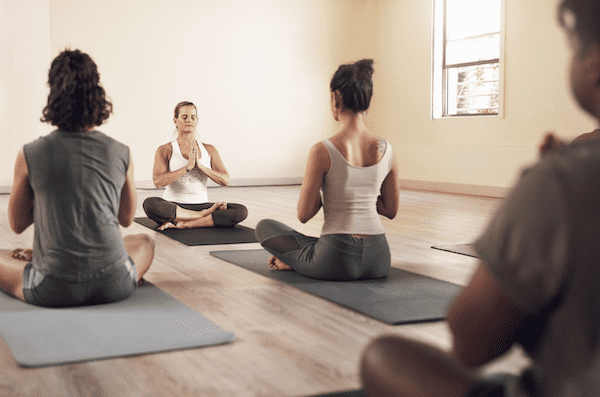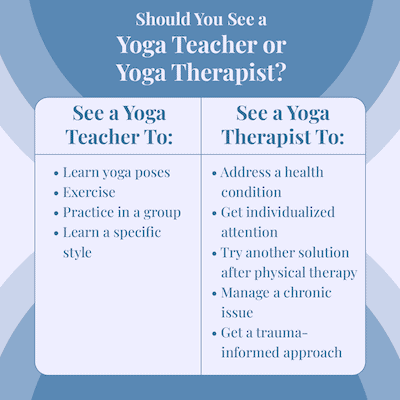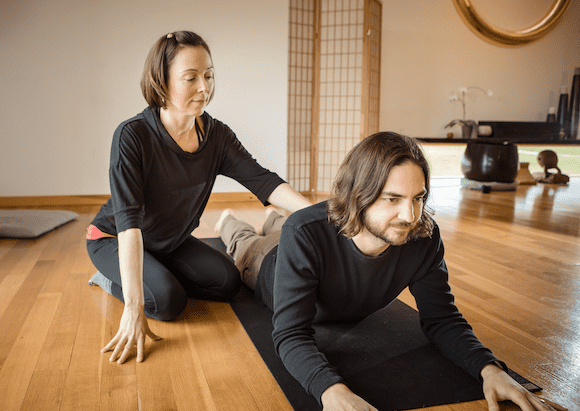
If you’re new to yoga, the difference between a yoga teacher vs. yoga therapist isn’t always clear at first. In short, a yoga teacher or instructor can lead students in practicing yoga in a yoga class, while a yoga therapist works one-on-one with a client applying yoga techniques to specific health conditions.
Still confused? Looking for more information? As a certified yoga teacher and yoga therapist myself, I know all about these two professions and the common misunderstandings about how they differ. Whether you’re interested in becoming a client or finding a career of your own in yoga, keep reading to learn more about yoga teachers vs. yoga therapists.
Table of Contents:
Simply put, a yoga teacher is tasked with teaching yoga. These yoga classes are often taught to groups of students within a certain style or system. Examples include:
Each one has its own way of training yogis to teach. In the Western context, yoga teachers are often trained to teach yoga classes that are primarily a physical practice. These sessions often have labels like “vinyasa,” “hatha,” “restorative,” or “yin.”
A well-trained and skilled yoga teacher can lead groups in a class setting, helping students learn whatever style or system they are sharing. Read our blog post about the most popular types of yoga to learn more about these common styles.
Yoga classes also have a therapeutic effect for many students. In addition, a very experienced and skilled yoga teacher can educate students in all aspects of yoga, helping them progress on a physical as well as a spiritual level.
But even if you find a yoga class therapeutic or have a very enlightened yoga teacher, that still doesn’t make it yoga therapy. Next, we’ll cover yoga therapists and start diving into the differences between a yoga teacher and yoga therapist.
A yoga therapist is tasked with applying yoga techniques to specific health conditions. This is performed one-on-one with individual clients, rather than in a group setting. A yoga therapist can help with both physical and mental health issues, such as:
A yoga therapist, therefore, must be trained in both the techniques (asana, pranayama, chanting, philosophy or point of view, and meditation) and the therapeutic applications of these techniques.
A yoga therapist—like anyone in the health field—must have knowledge of the conditions they are working with. Yoga therapists are trained to look at health conditions through a yoga therapy lens, as well as assess from a Western medicine perspective.
One way of differentiating a yoga teacher vs. yoga therapist is that unlike a yoga teacher who may work in a particular style or system, yoga therapists work with specific health conditions. They apply yoga techniques, rather than a particular style. Yoga therapists approach health issues with a yogic and Ayurvedic model as well as Western science.
So aside from the different work that yoga therapists do, what makes them a yoga therapist? Can anyone call themselves a yoga therapist?
Fortunately, the answer is no! In order to be considered a yoga therapist, you must receive yoga therapy training and become a certified yoga therapist.
These requirements help to maintain standards and safety among yoga therapists. For more information about yoga therapy training, jump ahead to The Difference Between Yoga Teacher and Yoga Therapist Training section.
With these differences in mind, you may be wondering when to see a yoga therapist vs. a yoga teacher.

You may want to look for a yoga teacher if:
You may want to look for a yoga therapist if:
Both yoga teachers and yoga therapists must undergo training in order to become certified. This typically involves completing a training program with a certain minimum number of hours.
After that, students can apply for certification if they meet all other requirements. For higher levels of certification, this may involve meeting a certain amount of time spent teaching yoga. Yoga teachers most often seek certification through Yoga Alliance and yoga therapists most often seek certification through the International Association of Yoga Therapists (IAYT).
Yoga teachers and yoga therapists are usually lifelong learners. In fact, yoga therapists are required to complete a certain number of continuing education credits in order to remain certified.
Aside from the differences in what they learn, the biggest difference between yoga teacher and yoga therapist training is that the entry point for yoga therapists is much higher. Keep reading for more information about yoga teacher vs. yoga therapist training below.
Those who want to become yoga teachers must at least complete a 200-hour teacher training. If they successfully complete the requirements of the training, then they are considered a certified yoga teacher (CYT).
The content of this training can vary from program to program, but it often includes learning about the core principles of yoga (both asanas and pranayamas, or yoga poses and breathing techniques) and how to apply them to a yoga practice. Students may also study yoga texts, history, anatomy, ethics, and even the business side of working as a yoga teacher.
For yoga teachers who want to deepen their knowledge or specialize in a certain area, there are other teacher training programs they can complete, such as:
Want to get started with your yoga teacher training? Apply to our 200-hour yoga teacher training today!
As mentioned in the previous section, there are several different options for yoga instructors to go beyond the basic 200-hour yoga teacher training. The highest level of yoga instructor recognized by Yoga Alliance is E-RYT® 500 (Experienced Registered Yoga Teacher 500-hour).
To register as an E-RYT 500, a yoga teacher must:
Yoga teachers can also achieve specialty designations through Yoga Alliance. They must be an RYT® 200 yoga teacher in order to be eligible, meaning that they have completed their 200-hour teacher training with a school that is registered with Yoga Alliance. There are two possible specialty designations:
Many yoga instructors who want to advance their career with more training and job opportunities also seek yoga therapy training and certification, discussed in the next section.
The IAYT (International Association of Yoga Therapists) has set the standard for yoga therapy training with a minimum training time of 800 hours. This is in addition to the prerequisite of a 200-hour YTT (yoga teacher training). Also, yoga therapy schools are tasked with graduating competent yoga therapists with a proven ability to work with medical conditions in a safe, effective way.
Since yoga therapists are always also trained as yoga teachers, it is easy to see why the public can get confused about who is a yoga teacher vs. yoga therapist. Yoga therapists often play both roles—teaching interested students yoga and working individually with clients that have health challenges.
Most essential is that those with physical or mental health issues looking to yoga for help consult with a yoga therapist as opposed to a yoga teacher. A yoga therapist will be trained in a variety of yoga techniques (including asanas, pranayamas, chanting, philosophy, and meditation) as well as how to apply those techniques therapeutically to specific health conditions.
At Breathing Deeply, we’re proud to support students on every step of this journey. Our 200-hour teacher training is designed with yoga therapists in mind so they can make the most of this education and seamlessly transition into their yoga therapy training. Whether students obtain their 200-hour YTT with us or another institution, we provide yoga therapy training that prepares them for their certification and career.
Becoming a certified yoga therapist through the IAYT (C-IAYT) is the highest level of yoga therapy certification. In order to get certified through the IAYT, you must:
To stay certified, yoga therapists must obtain at least 24 continuing education credits every 3 years.
With Breathing Deeply, students can obtain their 200-hour YTT if needed and complete their 800-hour yoga therapy training, giving them the support and education necessary to achieve certification.
Although it requires more training to become a yoga therapist than to become a yoga teacher, it is well worth it. We even get students who have already becoming practicing mental health professionals who seek yoga therapy training to better serve their clients. The benefits include:
For clients who want to use yoga to heal, individualized sessions with a yoga therapist will have much better outcomes and minimize the chance of an untrained yoga teacher inflicting harm due to lack of knowledge and education. One major difference between yoga teachers and yoga therapists is that yoga teachers are not educated about pathology and are not necessarily trained in any trauma-informed practices.
Anyone who wants to help clients this way will find that it is very much worth becoming a yoga therapist.

At Breathing Deeply Yoga Therapy, we pride ourselves on providing high-quality yoga therapy education with continuing support for yoga therapists. We also offer 200-hour yoga teacher training that is uniquely positioned to help students on the path to becoming yoga therapists.
We are confident that our students and, in turn, graduates are educated in a way that promotes positive client outcomes and integrity in this rapidly growing field.
Ready to begin your training and become a yoga teacher or yoga therapist? Apply to one of our programs today. A new class will be starting soon!
Brandt talks about common questions applicants have about the Breathing Deeply Yoga Therapy Program. Tune in to get the full program details.
Friends in Yoga, The way we perceive the world is a curious thing. Is it on fire or getting better? Are we facing our challenges or shying away from them? Are we functioning from the present or some altered reality based on past experiences? The teachings tell us that reality is ultimately timeless. The vibration […]
There’s no doubt that yoga is gaining popularity, but you may be asking yourself, what is the most popular type of yoga? Where is each type most popular in the U.S. and around the world? And for those who are interested in trying it themselves, how can you practice these styles of yoga safely? For […]
Friends in Yoga, Sitting on a cushion, taking a yoga class, chanting a mantra before your morning coffee…no one would call these radical acts. They are small choices that we make to better ourselves. The motivation to practice often takes form by our desire to be healthier, to be more focused, to connect with our […]